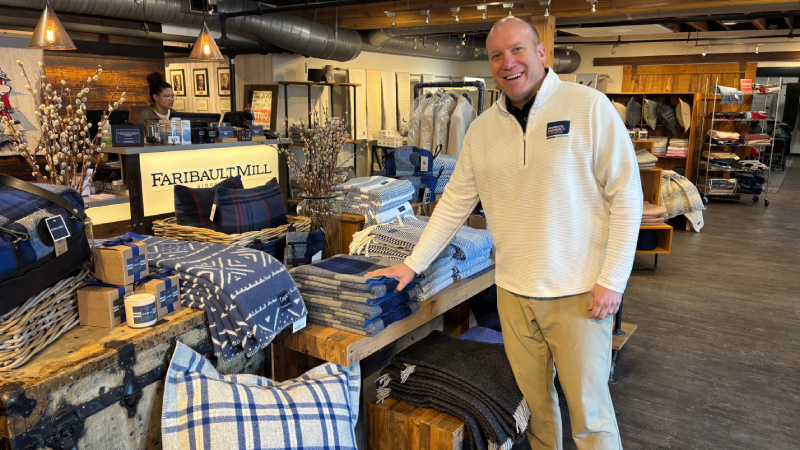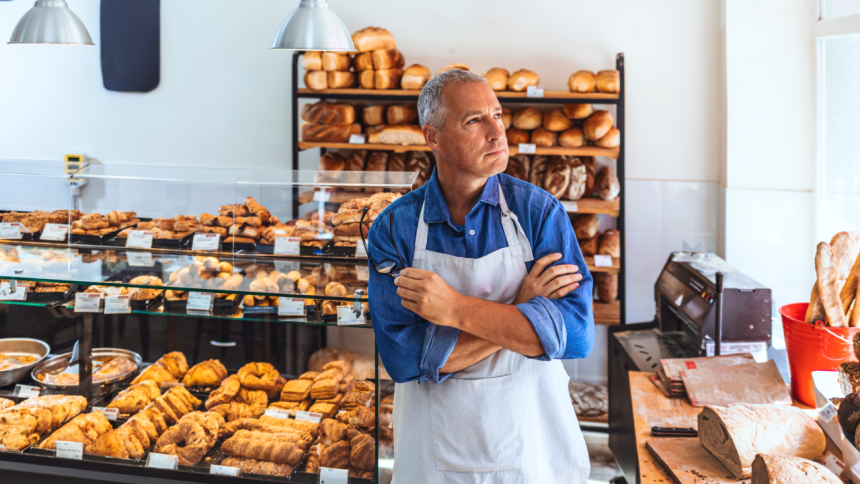President Donald Trump’s tariffs are leaving small business owners wondering if they can keep up with new potential disruptions in the supply chain.
Trump announced 25 percent tariffs on Mexico and Canada in late January, along with a 10 percent tariff on China in retaliation for claims around weak border security and fentanyl smuggling in those countries.
Canada and Mexico’s tariffs were paused for the next month as negotiations continue, while talks with Chinese officials are ongoing. However, the threat still looms – especially as Trump and vice president J.D. Vance have emphasized the need for a return to domestic trade and production in the United States.
Online merchants face tough conditions
For small business owners, the impact of these tariffs – though paused – is being made apparent almost immediately.
Forrest Webber owns The Trade Table, an online home improvement store that offers everything from bathtubs to fridges. The Trade Table’s supply chain comes from “all over” with the site featuring over 100 brands from Canada, the United States, China and other countries.
One Canadian supplier reached out to inform Webber of a 25 percent price hike earlier in the week – a move that was walked back upon the tariff pause a day later.
Even so, appliances will likely be hit hard by future tariffs. Electronics, appliance parts and raw materials such as steel are all sourced from countries targeted by the tariffs. Half of the suppliers for The Trade Table’s appliances are outside the United States.
“We’ve dug ourselves in a deep hole over the past 50 years. Everything’s outsourced,” Webber says. “Just going off of appliances, a lot of it is sourced out of China.”
Price hikes are on the menu
The United States’ business ecosystem, as it stands, is heavily dependent on outsourcing. Cheaper overseas materials, goods and labor have incentivized suppliers and wholesalers to shift their supply chains internationally, drying up demand for US-based suppliers.
Take cut flowers, for example. 80 percent of the flowers such as roses are imported from countries in Central America and Africa. Where California and Colorado once dominated the cut flower market and supplied the majority of American floral demands, trade agreements that reduced taxes and encouraged trade with Colombia and other countries supplying cut flowers quickly outpaced domestic growers.
Now with tariffs coming into play, and with the Trump/Vance administration moving on its promises to push production and manufacturing back to the United States, small businesses dependent on the decades-old global supply chain are left scrambling.
For restaurant owners like Raul Luis, who owns the Birrieria Chalio restaurant chain in Texas and California. For Luis, the tariffs are increasing costs on multiple fronts.
EXPAND
Both Birrieria Chalio’s serve a variety of Mexican dishes, including handmade tacos, menudo and birria – nearly all of which have ingredients sourced from Mexico and Canada.
Luis gets beef tripe for menudo from both Mexico and Canada, along with specific beef cuts for stews and tacos. Fruits and vegetables – such as avocados for guacamole and mangoes and tomatoes for salsa – also come from Mexico. He also relies on paper goods from China for takeout containers and cutlery.
Luis prepared for the possible tariffs in late 2024, ordering paper products for takeout containers in bulk to avoid price increases. But those supplies will run out eventually, and Luis can’t stock up on fresh items like avocados and lettuce ahead of time.
Luis’ restaurant supplier warned their customers ahead of time that pricing would increase dramatically. “They said to expect price increases,” Luis said. “And we’re going to have to pass it on to the consumer.”
Luis is contemplating adding a takeout surcharge for the extra paper supplies used for takeout containers, downsizing the restaurant’s offerings and possibly even taking prices off of the menu altogether to adapt to rapidly changing costs.
Luis says the price increases may create a “ripple effect” in the restaurant industry, as restaurants navigate balancing their customer’s needs and maintaining profit margins that are thin even in the best of times.
This is coming at the tail end of a long period of inflation, where price hike-weary customers are becoming tighter with their wallets as the economic climate becomes more uncertain.
“I think consumers are scared,” Luis said. “They want to hold on to their disposable income.”
In the meantime, Luis anticipates it will take “a while” for the supply chain and the food industry to adapt.
“There are going to be some pains,” he said. “Restaurants will have to get creative, or we’re going to have to educate the consumer.”
Tariffs leave Made in the USA manufacturers unruffled
Not all businesses have been hit hard by the tariffs. For Ross Widmoyer, president and CEO of Faribault Mill in Minnesota, “Made in the USA” is the motto for the entire supply chain.

EXPAND
Faribault Mill is what Widmoyer calls a “vertically integrated” brand. The company sells woolen blankets, sheets, winter wear and other wool items – nearly all of which are processed, woven, dyed and packaged entirely within the United States.
While the mill does import some material from New Zealand, switching wouldn’t be an issue – to the point where approximately “95 percent” of Faribault’s inventory is American-sourced.
“Our supply chain is pretty well shored up domestically,” Widmoyer says.
Running an all-American company isn’t easy. The company’s 160-year legacy has given the company a runway and a legacy to work off of, from its long-term suppliers to its equipment. Faribault’s machinery requires a team of experienced mechanics to repair and run smoothly, which requires generational knowledge passed down from worker to worker – some of whom have been working for Faribault for generations.
“We have people who have been working at the mill for their entire career, and their parents did it, and their grandparents did it as well,” Widmoyer says.
The payoff, Widmoyer says, has been substantial. Faribault – named for the town it resides in – has been a major source of jobs and income for the town and surrounding areas.
While Faribault’s model is one to aspire to, the transitional period small businesses are facing now won’t be a quick or an easy one.
“There are always barriers to entry in every industry. To produce domestically, there’s a moat to entry,” Widmoyer says.
Should the tariffs come into effect, relocating manufacturing plants and raw material suppliers to the United States will take time, during which small businesses will have to navigate limited supply and prices heightened by tariffs.
Finding skilled workers is another challenge, Widmoyer says – especially as institutional knowledge of mechanics and fabrication has been lost as manufacturing moved overseas.
“If we can teach and train people to love being part of a manufacturing company like ours, it would a be a great end result,” Widmoyer says. “They’re important jobs. These people depend on them and these communities depend upon them””
Tariffs spell woe for specialty goods businesses
While turning to domestic suppliers may be a solution for some businesses, for Heather Perry, CEO of California coffee company Klatch Coffee, using an American supply simply isn’t possible.

EXPAND
While some coffee is grown in Hawaii and certain parts of California, it’s not enough to keep up with Americans’ daily caffeine needs. Most of the world’s coffee is grown near the equator, making imports a necessity.
“I would love it if tariffs did not apply to coffee,” Perry says. “It’s just not something the US can compete in.”
Coffee prices have already doubled over the past three months due to a combination of environmental factors and market squeezes. Trump’s latest round of tariffs puts Perry and Klatch Coffee in a difficult position – raise prices and lose customers, or continue to see her profit margin shrink.
“It’s exhausting for consumers to see prices creep up monthly,” Perry said. “It’s really a delicate balance.”
Perry has tried to strike that balance by introducing increases on a more infrequent scale, if only so her customers don’t see their daily cup of joe getting more expensive by the week. Meanwhile, she’s keeping an eye on how the tariff situation develops after the pause ends.
“Nobody knows what’s going on,” she says. “We have no idea what to expect.”
Uncertainty and hope for business owners
How the tariff situation will develop remains to be seen, leaving small business owners in the dark as they evaluate their pricing and their supply decisions.
However, as the delicate balance of the global supply chain – and of America’s formerly domestic-focused economy – becomes more apparent, tariffs may represent a change for the better.
While tariffs will hike the prices of his appliances, Webber expressed a desire to source more products in the United States.
“I live here. I’d rather keep the finances flowing,” he said. “I can definitely see it coming back to the US, but it’s going to take a long time.”
While Luis anticipated some growing pains as the restaurant industry adapts, he expressed hope that the tariffs may push a shift to US-based suppliers and manufacturers, fueling the American job market.
“I’m very hopeful,” Luis said. “I pray the administration has more information than we do, and that they are making the right moves. Where there’s a fire, there’s rebirth.”
Read the full article here
















